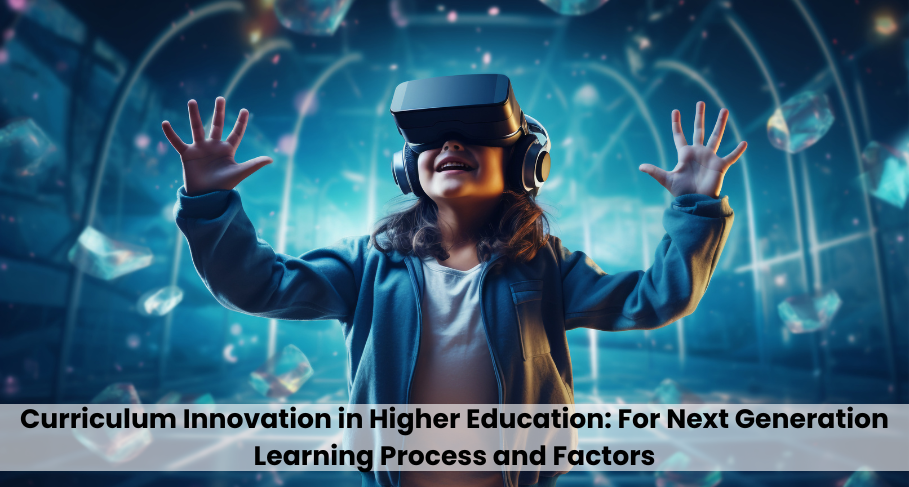In the technology-driven competitive era, higher education institutions are mainly driven by a commitment to excellence, relevance, and inclusiveness. To stay intact curriculum innovation becomes mandatory in a higher education scenario. Curriculum innovation is a dynamic process focused towards meeting the evolving needs of the learners and the society. It aims to empower students with the right knowledge, skills and mindset to thrive in the interconnected world. Curriculum innovation helps the institutions and allied stakeholders in heterogeneous aspects. It becomes crucial to foster entrepreneurship, innovation, lifelong learning and career mobility. In the ever-evolving environment of higher education, the traditional approach to curriculum design and delivery is no longer sufficient to meet the diverse needs of students, employers, and society. Curriculum innovation has emerged as a transformative process to reimagine educational programs to better prepare students for future challenges and opportunities.
Curriculum innovation involves a deliberate and systematic effort to rethink the content, structure, delivery methods, and assessment practices of academic programs. It seeks to foster more effective learning outcomes, enhance student participation, promote interdisciplinary learning, and align educational programs with the demands of an increasingly globalized and technologically driven world.
Process in Curriculum Innovation- An Overview
The process of curriculum innovation in higher education typically involves several key stages, each aimed at reimagining, designing, implementing, and evaluating educational programs to cater for the needs of the stakeholders concerned. The following aspects needs to be considered as part of the process:
Need Assessment and Gap Analysis
To have a fruitful learning engagement, it is important to understand the stakeholder perspective from time to time. A good analysis of the various requirements from the stakeholders, viz, with students, faculties, industry experts, policymakers, and management to understand the needs becomes necessary. A gap analysis needs to be performed, and challenges to be addressed accordingly.
Goal Setting
Establishing a clear vision for the future in terms of the curriculum by articulating the expected learning outcomes and pedagogical approaches is required. Setting SMART (Specific, measurable, achievable, relevant, and time-bound) goals to address the gaps identified is necessary.
Curriculum Design and Development:
Identifying the learning outcomes and aligning them with the vision and goals is a very significant step in the whole process. This is followed by identifying appropriate pedagogical approaches and assessment strategies to support diversified learning needs. Accordingly, this activity would end with designing and developing the course content appropriately.
Pilot Testing
The redesigned curriculum should be subjected to pilot testing, and it is desirable to have a swot analysis done. Necessary feedback must be obtained and revised based on the required feedback.
Implementation
The redesigned curriculum is to be rolled out with adequate faculty training, logistical support and timely communication to the stakeholders concerned.
Monitoring and Continuous Improvement
A comprehensive evaluation of the redesigned curriculum must be performed to ascertain its overall effectiveness and impact. Based on this, corrective measures should be taken appropriately.
Collaboration, communication, and shared governance among stakeholders throughout the curriculum innovation process are essential to fostering buy-in, ownership, and sustainability of the implemented changes. Additionally, maintaining a focus on equity, inclusivity, and diversity ensures that the redesigned curriculum serves the needs of all students and promotes equitable access to high-quality.
Factors Shaping Curriculum Innovation
Curriculum innovation becomes pivotal in the higher education scenario. Various aspects influence curriculum development, which should be placed under the activities for continuous process improvement to adapt to changing societal needs, technological advancements, and educational best practices.
Relevance to Industry and Society
The curriculum should align with the current and future needs of industries and society to a greater extent. This may involve conducting surveys, consulting with industry professionals, and analysing market trends.
Interdisciplinary Approach
Incorporate interdisciplinary perspectives to address complex real-world problems. Encourage collaboration between departments to provide students with a holistic understanding of issues.
Technology Integration
Integrate technology effectively to enhance learning experiences. This includes leveraging online platforms, multimedia resources, and interactive tools to engage students and facilitate active learning.
Global Perspectives
Incorporate global perspectives to foster cultural competency and prepare students for a diverse and interconnected world. Offer opportunities for international collaboration, study abroad programs, and cross-cultural experiences.
Experiential Learning
Provide hands-on experiences such as internships, research projects, service learning, and simulations to bridge the gap between theory and practice. These experiences enhance students’ employability and critical thinking skills.
Assessment and Feedback Mechanisms
Implement robust assessment and feedback mechanisms to gauge student learning outcomes and continuously improve the curriculum. Use a variety of assessment methods, such as project-based assessments, peer evaluations, and self-assessments.
Continuous Improvement
Establish mechanisms for continuous improvement and evaluation of the curriculum based on feedback, data analysis, and emerging trends. Stay agile and responsive to changes in the educational landscape.
In summary, revisiting the curriculum periodically is mandatory for effective classroom engagement and to facilitate the needs of future learners. It is also equally important to incorporate an agile mechanism to withstand and swiftly respond to the dynamic and diversified learning needs of present and future learners.


